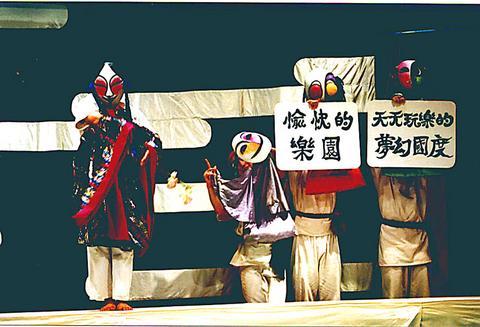If the Christmas and New Year's parties have left you looking for some low-key entertainment for this weekend, the Gu Ling Experimental Theatre Festival may provide the right hangover remedy. The festival, which began at the end of November, presents its last three performances by groups from Hong Kong, the US and Japan.
Before appreciating the performances, the festival venue -- Gu Ling Street Experimental Theater -- is worth a visit in itself. Gu-ling Street is filled with nostalgic atmosphere and is best known as the place to go to find old and rare books in Taipei.

PHOTO COURTESY OF HITOMI'S DEAF PUPPET THEATER
The theater's building dates from 1906, when it housed a police station until the early 1990s. In 2001, through the effort of local activists, the once deserted old police station was renovated and named Gu Ling Street Experimental Theater. The Japanese-style detention room was preserved for viewing and is occasionally used to display installation art.
Similar to SPOT Taipei Film House, the historical building, with its bookstore, audio-visual room and cafe, has become a popular hangout for Taipei's arts community.
Tonight at the festival is Hong Kong artist Feng Cheng-Cheng's (馮程程) Solo of a Solitary Acrobat (寂寞的自由體操). This solo show mixes acrobatic performances and elements of a magic show. The story is roughly based on American author Gertrude Stein's children's book The World Is Round, but also incorporates the true story of Yelena Mukhina, a Russian free-style acrobat famous in the 1970s. According to Feng, the play is about walking and searching.
Next Saturday, US-based artist Marilyn Arsem will present two short pieces, Dreams (breathe/don't breathe) of Home and The Beginning or the End. The first play is rich with ceremonial body movements, creating images that swing between humor and fright, and bring an unsettling atmosphere. In the second play she uses an odd mix of props, including fish, bread, and bones, to create a peculiar lullaby.
The last group performing at the festival is the Japanese group Hitomi's Deaf Puppet Theater, who will present their play on Jan. 16. This theater group is composed of hearing-challenged and hearing actors, as well as puppet performers. The performance mixes Japanese sign language, puppet and body expression to tell an endearing Japanese folktale about a magical raccoon that is saved by a lonely granny living in the mountains and tries to fulfill the old lady's last wishes.

On April 26, The Lancet published a letter from two doctors at Taichung-based China Medical University Hospital (CMUH) warning that “Taiwan’s Health Care System is on the Brink of Collapse.” The authors said that “Years of policy inaction and mismanagement of resources have led to the National Health Insurance system operating under unsustainable conditions.” The pushback was immediate. Errors in the paper were quickly identified and publicized, to discredit the authors (the hospital apologized). CNA reported that CMUH said the letter described Taiwan in 2021 as having 62 nurses per 10,000 people, when the correct number was 78 nurses per 10,000

As we live longer, our risk of cognitive impairment is increasing. How can we delay the onset of symptoms? Do we have to give up every indulgence or can small changes make a difference? We asked neurologists for tips on how to keep our brains healthy for life. TAKE CARE OF YOUR HEALTH “All of the sensible things that apply to bodily health apply to brain health,” says Suzanne O’Sullivan, a consultant in neurology at the National Hospital for Neurology and Neurosurgery in London, and the author of The Age of Diagnosis. “When you’re 20, you can get away with absolute

When the South Vietnamese capital of Saigon fell to the North Vietnamese forces 50 years ago this week, it prompted a mass exodus of some 2 million people — hundreds of thousands fleeing perilously on small boats across open water to escape the communist regime. Many ultimately settled in Southern California’s Orange County in an area now known as “Little Saigon,” not far from Marine Corps Base Camp Pendleton, where the first refugees were airlifted upon reaching the US. The diaspora now also has significant populations in Virginia, Texas and Washington state, as well as in countries including France and Australia.

May 5 to May 11 What started out as friction between Taiwanese students at Taichung First High School and a Japanese head cook escalated dramatically over the first two weeks of May 1927. It began on April 30 when the cook’s wife knew that lotus starch used in that night’s dinner had rat feces in it, but failed to inform staff until the meal was already prepared. The students believed that her silence was intentional, and filed a complaint. The school’s Japanese administrators sided with the cook’s family, dismissing the students as troublemakers and clamping down on their freedoms — with